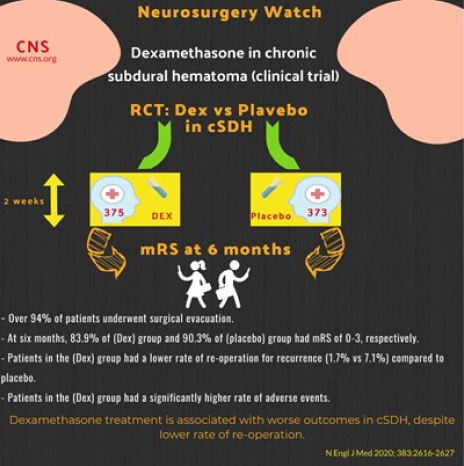Trial of Dexamethasone for chronic subdural hematoma

- Chronic subdural hematoma is one of most common neurological disorders, especially among older patients, and is associated with significant morbidity and mortality
- Main stay of treatment for chronic subdural hematoma is surgical evacuation, although it is associated with complications such as recurrence
- Glucocorticoid has been used in the treatment of chronic subdural hematoma for a number of years, and it may reduce the need for surgery or the risk of recurrence
- The study is a randomized controlled trial comparing adult patients with chronic subdural hematoma who received a 2-week course of dexamethasone versus placebo with the primary outcome measured by modified Rankin Score (mRS) at 6 months.
- The study enrolled 750 patients across 23 sites in United Kingdom, with 680 patients completing the study with the primary outcome assessment.
- Over 94% of patients underwent surgical evacuation, with over 97% of cases done during the index admission.
- At six months, 83.9% of patients in the dexamethasone group achieved mRS of 0-3, while 90.3% of patients in the placebo group have mRS of 0-3.
- Patients in the dexamethasone group also did worse in several secondary outcome measures including mRS at discharge and 3 months, mortality and EQ 5D-5L utility score.
- However, patients in the dexamethasone group had a lower rate of needing an operation in subsequent admission (5.1% vs 7.6%) or the need for re-operation (1.7% vs 7.1%).
- Patients in the dexamethasone group also had a significantly higher rate of adverse events.
- Therefore, although dexamethasone treatment potentially reduces the need for repeat operation, it is associated with worse outcome
- However, as over 90% of patients underwent surgery during the index admission, it is not clear whether dexamethasone treatment will reduce the need for an operation for patients treated conservatively at the beginning.

Source
New England and Journal Medicine